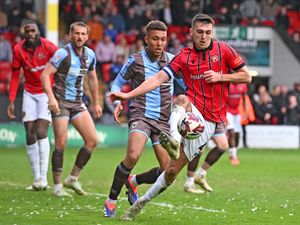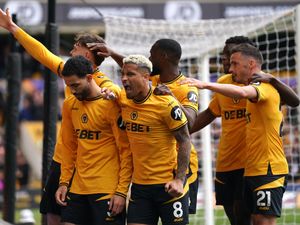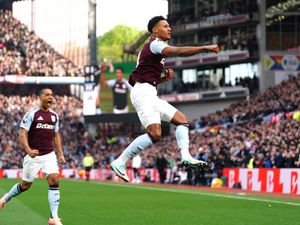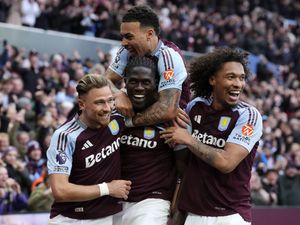The Big Interview: Bruce Grobbelaar
Bruce Grobbelaar had his fair share of Black Country experiences before a glittering career got up and running with Liverpool.
The 59-year-old still stands tall as the most decorated goalkeeper the Reds have ever had between the sticks due to his medal haul,
Ray Clemence remains Liverpool's record appearance holder as a shot-stopper, with 641 games to leave him fourth on the club's overall list.
Grobbelaar, who sits ninth overall, ran him close with 628 matches in their jersey but a haul of six league titles, three League Cups, three FA Cups and a European Cup.
He was nearly 24 by the time he arrived at Anfield for a 13-year stint, from 1981 to 1994, but was no stranger to England.
He'd first visited the country in 1979, after he'd already left his roots behind to join Canadian outfit Vancouver Whitecaps in the North American Soccer League.
An Englishman, former Blackpool goalkeeper Tony Waiters, was in charge of the Whitecaps and Grobbelaar initially served as second-choice to a Black Country boy, ex-Wolves star Phil Parkes.
A trip to the West Midlands would follow when he landed a trial with West Bromwich Albion, then flying high as top-flight title contenders under boss Ron Atkinson.
'Big Ron' wanted to bring him to the Hawthorns permanently, too, but recurring problems with a work permit scuppered the move.
Bournemouth and Derby County were other possible destinations, but encountered the same issues when making their enquiries.
Grobbelaar would make his Football League debut before 1979 was out, though, when he was borrowed by Division Four basement boys Crewe Alexandra.
He helped the Railwaymen to climb the table and was even allowed to score a penalty for them, in a 2-0 end-of-season win against York City. Scouts continued to monitor his progress.
Despite having now found a way to obtain permission to play in England permanently, Grobbelaar spent 1980 back with the Whitecaps. He was No 1, as Parkes had moved on.
But Liverpool came calling the following year and, on 17 March 1981, he completed a £250,000 transfer to become, initially, just their reserve goalkeeper.
He had already been sounded out by Reds boss Bob Paisley, after a meeting that took place in Birmingham.
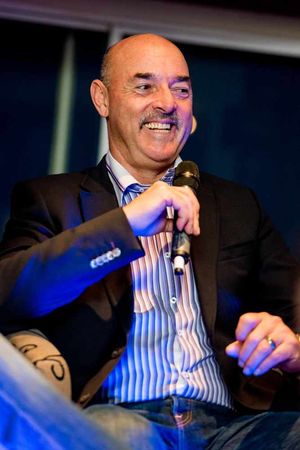
He said: "I got a letter one day and it was from West Bromwich Albion, from their manager Ron Atkinson, inviting me to come to England.
"I had five months of training there and trying to get a work permit and, in the end, it didn't happen. I asked Ron what to do and he suggested that I go down to Bournemouth.
"He told me he had a mate there, Harry Redknapp, who might be able to sort me out a club, but he couldn't get it done either.
"I was coming back up and I was told to go to Derby County, because Tony was there. We had a chat and they wanted to sign me, too. West Brom actually lost out, as they would find out later.
"I ended up going to Vancouver, played three games for the first-team and, after that season, Tony wanted to send me to the English league. I thought I would be going back to West Brom.
"I thought it might even be Wolves because a friend of mine, Phil, had played for them. After all that, I went to Crewe.
"They were 92nd in the Football League and I thought they must be the strongest team, because they were holding everybody else up!
"I still couldn't get a work permit but it was only on loan, I got there in October and, in the December, I rang my mother.
"I wanted to know if anyone in our family had been born on British soil and, as it turned out, my great-grandfather was with the Lancashire Fusiliers during the Boer War.
"They had been stationed at a fort in a castle and he had a son, so my grandfather had been born in that castle, which was a British stronghold. With that, I got an ancestral Visa!
"I played 24 games for Crewe and, 20 times, one club had come to see me play. Tony Waddington (Crewe manager) told me it was Manchester City.
"We'd only lost twice in that time and Crewe climbed to 86th place in the Football League at the end of the season, the first time they had been out of the relegation zone.
"I knew that Liverpool had also watched me once when I was at Crewe, so there was talk that they would sign me and loan me back to Vancouver.
"I was playing regularly when I got back, as 'Lofty' had moved on. I remember we had a game against San Diego one day.
"We lost in a shoot-out, which in their league was a player having the ball 35 yards out and trying to beat you in five seconds.
"I was laying in the bath afterwards, Tony comes to me and told me he had just sold me to Liverpool. He gave me my plane ticket and I was on my way.
"I had met with Bob Paisley, the Liverpool manager, in Birmingham at a hotel just outside of New Street station. I hadn't signed, because I didn't have my lawyer with me, but I wanted to go there.
"The next time, I only had luggage to take with me from Vancouver, which I had on the trolley with me from London Heathrow. In the end, it all happened very quickly."
There was a touch of irony that his Liverpool debut, coming to the fore after Clemence cut his ties and joined Tottenham the previous summer, would come on Black Country turf.
Grobbelaar first started a First Division game at Wolves on 28 August 1981, where he would be picking the ball out of his net at Molineux after Mick Matthews scored the only goal of the game.
He was one of three debutants on show for the season opener with Mark Lawrenson and Craig Johnston making their bow, complementing a team that was already packed with stars.
Grobbelaar said: "We had Phil Neal, Phil Thompson, Alan Hansen and Alan Kennedy in defence, a midfield of Graeme Souness, Terry McDermott and Ray Kennedy and Kenny Dalglish up front.
"We also had Steve Heighway on the wing and Sammy Lee came on as a substitute. Ian Rush and Ronnie Whelan were on the bench. We already had some great players.
"Phil, if only he could actually jump for the ball. I came from the far to the near post to find the left winger getting in behind him. In he went and it was 1-0. He was a great player, though."
Grobbelaar's opportunity with the reigning European champions were a far cry from his humble beginnings in Rhodesia, which was renamed Zimbabwe in 1980.
He had emigrated there from South Africa when he was just two months old and won 33 caps playing for the country over his international career.
There was a British influence when he started out with Salisbury Callies as a teenager, then linking up with established top-flight side Highlanders.
A short stint with Chibuku Shumba preceded time back in South Africa, with spells at Highlands Park and Durban City.
Race had already played its part, from the whites-only Callies to opposition of his presence at the predominantly-black Durban.
He then had to choose country over club in its highest form, spending two years on national service with the Rhodesia Regiment.
Grobbelaar would leave behind his roots for good when he joined Whitecaps and still lives in Canada, having settled in Newfoundland.
He recalls of his youth: "My career had started off when I was 14-years-old, a Scotsman comes to me one day and wanted me to sign for his club. I didn't think my mum would allow me to.
"He convinced her I could be a good goalkeeper and I joined the Callies - the Caledonian Society. There were Scots, a couple of Irish and Welsh and the treasurer was English.
"Living in Africa, I could do all of the sports. I also played cricket and baseball and, in the winter, I played football and rugby. I played cricket, football and rugby for my country.
"Because I'd signed that contract, I could only play football. They have me $10 at first, then $2 for a win and $1 for a draw.
"Then my mother moves for work and I get a call from another club. The guy there was the chairman, coach and manager of the local Post Office.
"He asked me how much I wanted for wages and I didn't know what to tell him. I got $50. We won the league and cup afterwards, I wished I'd have asked for $500!
"They sold me to another club, which turned out to be a brewery team. It lasted six weeks before I thought 'I'm out of here.'
"I later got a letter telling me I had to go on national service, I spent two years in the Rhodesian army. I didn't like it, I couldn't wait to leave."
All of these experiences toughened him up for life at Liverpool, where he overcame an error-strewn start to his time there to become a cornerstone of the side.
Only the FA Cup was left to win of the domestic honours by the time Liverpool reached the 1984 European Cup final, against Roma at the Stadio Olimpico in Rome.
The tie went to penalties after a 1-1 draw, with Grobbelaar doing his utmost to distract the opposing players stepping up to take their spot kicks.
Biting the back of the net, in imitation of eating spaghetti, and wobbling his legs in mock terror preceded Bruno Conti and Francesco Graziani both blazing their efforts over the bar.
Alan Kennedy stepped up to fire Joe Fagan's Reds to the richest prize in club football, just as he had in the 1981 final with the normal-time winner against Real Madrid.
Grobbelaar said: "Joe told me he, the chairman and directors, coaches, captain, team-mates and 90,000 fans are not going to blame you if you can't stop a ball from 12 yards!
"I shook my head and went 'thanks' and the last thing he told me was 'try to put him off.' Conti picked the ball up and you could almost hear him singing to himself.
"I stood on the line with the spaghetti legs and all of the confidence went out of him. He took the kick and it's gone over the bar.
"I couldn't get in the goal quick enough for the next ones, then Graziani marches up to the penalty spot for the last one.
"He kisses the ball, crosses himself, puts it down and walks away, I went early and then changed direction, he's sidestepped it and knocked it over the bar.
"I was supposed to have taken a penalty, but it went to Alan Kennedy instead. He's told us all 'bottom right' and gone bottom left. It was a shank, just like before. He's got two of them!"
Grobbelaar survived four managers in Paisley, Fagan, Kenny Dalglish and Graeme Souness, leaving after Roy Evans took charge.
Paisley brought him in and retired in 1983, with assistant Fagan replacing him and winning the league, League Cup and European Cup in his first season.
The 1984-85 season was trophyless but Liverpool again reached the European Cup final, looking to retain against Juventus in Brussels.
The Heysel Stadium disaster before kick-off, where 39 people died after a wall collapsed as fans clashed, led to English clubs being banned from European football for five years.
A haunted Fagan called time himself shortly afterwards, with Dalglish becoming player-manager. He provided the club's last league title, in 1990, before resigning a year later.
Grobbelaar believes the reason he quit was because the board wouldn't back him with enough funds to sign Alan Shearer, who Dalglish would take to Blackburn a year later for £3.6million.
Another former team-mate, Graeme Souness, would take over the hot-seat but a controversial reign would end with his resignation in January 1994.
Grobbelaar would leave at the end of that season, having lost his place through injury to David James. Roy Evans, the last of the 'boot room,' was now in charge.
He was hurt in the last minute of a league game at Leeds United on 19 February 1994 and it turned out to be his swansong, after 13 years at Anfield.
He said: "Bob Paisley was a true person of football and the knowledge that he had was uncanny. He was one of the greats.
"Then there was 'Smokin Joe.' He must be remembered as one of the greatest managers ever. Anybody who won that amount of trophies in a short time must be put on that pedestal.
"Heysel took him out of that zone and he left shortly afterwards. Had that not happened, he might have become the best ever.
"Then there was 'King Kenny' and my version of why he resigned was over a player he wanted. The rumours were there he wanted a British transfer record transfer.
"This player would have made a real difference to Liverpool over the next five to 10 years, no doubt. Kenny then went to Blackburn and signed that very striker.
"I believe that if Kenny had signed Alan Shearer then, he would have stayed and his legacy would have been much greater.
"Graeme Souness was the best player I have ever played with in my life and that's where I'm going to leave that one, on the pitch.
"The last manager I ever played under at Liverpool was the nicest man you could ever wish to meet in Roy Evans, but he was too nice to be a manager.
"He couldn't tell me I was going to get a free transfer, I was going to a charity golf tournament at the end of the season and I read it in the newspaper. He was going to talk about it after the golf!"
Grobbelaar stayed in the Premier League after his release, joining Southampton, but a match-fixing storm was to engulf him that November.
A national newspaper accused him of rigging games while at Liverpool, but he would play on and keep a clean sheet for the Saints against Arsenal in his next appearance.
He helped Alan Ball's men to safety and stayed at the Dell for another season, before drifting down the English leagues. He was later cleared of the allegations.
He turned out for Plymouth, Oxford United, Sheffield Wednesday, Chesham United, Lincoln City and Northwich Victoria before hanging up his boots.
He's now in management serving as assistant boss to Paul Dalglish - son of Kenny - at Canadian outfit Ottawa Fury as they join the United Soccer League.
He added: "I wanted to sue when I got presented with that newspaper article. Alan Ball asked me six times if I did i and I promised him that I didn't.
"It was two days before we were playing Arsenal on the Monday night, I started the game and went on to play in 80 per cent of that season.
"Southampton finished in 10th place, which was the highest spot they had ever had in the top flight. Towards the end, Alan was asked me why he persisted in playing me.
"The newspaper issue came up again with one journalist and he joked 'we've had more luck with Bruce throwing matches then Dave Beasant (second choice) trying to win them!'
"I've was perhaps my last real achievement that I helped to keep them in the Premier League. I went all around the houses after that."

